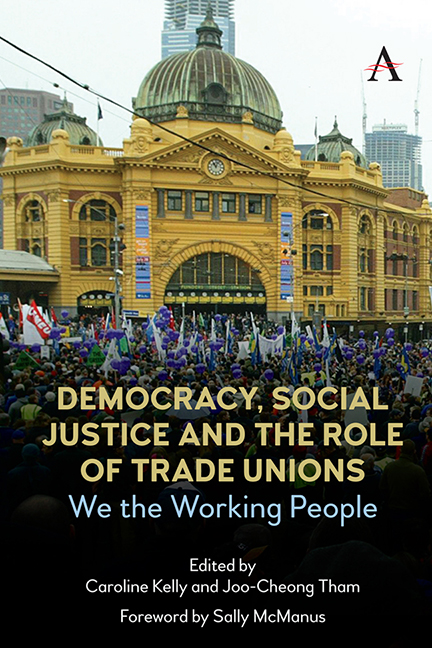Book contents
- Frontmatter
- Contents
- Foreword
- Acknowledgements
- Chapter 1 Democracy and Social Justice as Organising Principles
- Chapter 2 Economic Democracy, Workers and Unions
- Chapter 3 Nobody Owns the Future
- Chapter 4 Regulatory Approaches to the Internal Affairs of Trade Unions in Australia: From Democratic Control to Corporate Accountability
- Chapter 5 Trade Unions and the Regulation of Election Funding: Between Libertarianism and Egalitarianism
- Chapter 6 Trade Unions and Precarious Work: In Search of Effective Strategies
- Chapter 7 ‘Is There an App for That?’ Worker Representation, Unions and the Gig Economy
- Chapter 8 Temporary Migrant Workers and Trade Unions in Australia: A Complex Relationship
- Chapter 9 Unions, Fossil Fuel Exports and a Just Transition
- Chapter 10 Trade Agreements, Labour Rights and Democracy
- Chapter 11 Trade Unions, Labour Law and Democratic Socialism: The COVID-19 Crisis in the United Kingdom
- Notes on Contributors
- Index
Chapter 1 - Democracy and Social Justice as Organising Principles
Published online by Cambridge University Press: 18 November 2021
- Frontmatter
- Contents
- Foreword
- Acknowledgements
- Chapter 1 Democracy and Social Justice as Organising Principles
- Chapter 2 Economic Democracy, Workers and Unions
- Chapter 3 Nobody Owns the Future
- Chapter 4 Regulatory Approaches to the Internal Affairs of Trade Unions in Australia: From Democratic Control to Corporate Accountability
- Chapter 5 Trade Unions and the Regulation of Election Funding: Between Libertarianism and Egalitarianism
- Chapter 6 Trade Unions and Precarious Work: In Search of Effective Strategies
- Chapter 7 ‘Is There an App for That?’ Worker Representation, Unions and the Gig Economy
- Chapter 8 Temporary Migrant Workers and Trade Unions in Australia: A Complex Relationship
- Chapter 9 Unions, Fossil Fuel Exports and a Just Transition
- Chapter 10 Trade Agreements, Labour Rights and Democracy
- Chapter 11 Trade Unions, Labour Law and Democratic Socialism: The COVID-19 Crisis in the United Kingdom
- Notes on Contributors
- Index
Summary
Trade unions are central to organised social life. They are among the largest voluntary organisations in society. They represent hundreds of millions of workers and, as workplace organisations, they are often the only effective vehicle to give voice to working people. They are often too a significant presence in politics. For instance, the peak international trade union body the International Trade Union Confederation represents 200 million workers in 163 countries and regularly participates in key policy-making forums such as G20, the International Monetary Fund, the World Bank and the International Labour Organization (ILO).
There is equally no doubt that the role of trade unions globally and in Australia is under serious challenge. The ILO Global Commission on the Future of Work observed that ‘changes in legal frameworks, together with changes in the organization of work and the persistence of informal employment, make it harder for workers to organize and represent their collective interests’. A publication arising from an ILO symposium on the future of trade unions similarly commented that ‘it has become harder for trade unions in both developed and emerging countries to protect the rights of workers and working conditions, as shown not only in the reduction of unionization, but also the fall in the labour share of income in most countries’. Among the key challenges it nominated were ‘technology, climate change and the increasing complexity of globalization’, sentiments that clearly correspond with the recognition in the ILO Centenary Declaration for the Future of Work that the present is ‘a time of transformative change in the world of work, driven by technological innovations, demographic shifts, environmental and climate change, and globalization, as well as a time of persistent inequalities, which have profound impacts on the nature and future of work, and on the place and dignity of people in it’.
These global tendencies are evident in Australia. Union membership is declining as a proportion of the labour force. Low and declining union density (around 15 per cent) and shrinking coverage of collective bargaining mean that many workplaces, especially in the private sector, are union-free and/ or union-hostile zones. Controversies surrounding a number of union officials have called into the question the legitimacy of trade unions. And for some governments, trade unions are not social partners but rather targets of restrictive legislation.
- Type
- Chapter
- Information
- Democracy, Social Justice and the Role of Trade UnionsWe the Working People, pp. 1 - 12Publisher: Anthem PressPrint publication year: 2021

